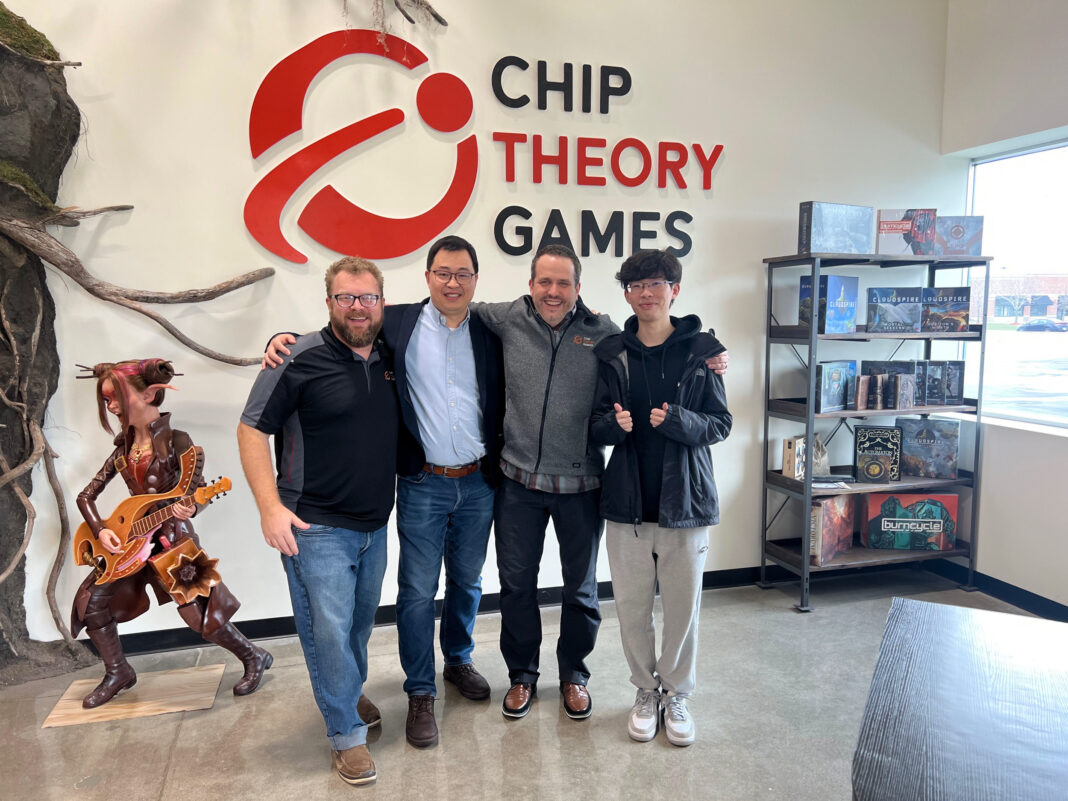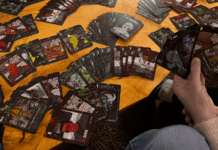To recall the origins of any story that began many years ago, we must rely on the memory of those who lived to tell it later. Though I have not lived their story myself, I’ve become ever intrigued to hear it unfold whenever my luck lands back at Chip Theory Games, listening to the Carlson cousins lend me their latest lore. So in the spirit of all great origin stories told by another, I’m going to borrow some creative latitude and quote a conversation that most certainly sounded something like this.
“Look, we both know we can do better than what’s out there,” Josh said, his eyes scanning the room, as if looking for eavesdroppers. “I mean, why can’t we have a game that’s as strategic as chess but as unpredictable as poker?”
Adam nods, stirring his coffee absentmindedly. “And we need quality that lasts. Remember how frustrated I got when those cardboard Catan pieces started peeling last week?”
Josh’s emphatic hand gestures respond in agreement as his fingers rub friction into a flurry of flimsy. Adam shakes his head while his eyes narrow behind his glasses in keen thought.
The name itself “Chip Theory”, is a homage to their commitment to high-quality, chip-based game components—a stark departure from the classic chain store games. The kind where beautiful box art beckoned you to buy into something original. But alas, a cornucopia of chintzy plastic to play across a glistening gameboard with just enough gimmicks to fool you a few rounds before the boredom of yet another linear and predictable game of mostly Sorry! Trouble. Roll over. Spin again…
Lasting Dreams
As it was described in “Kickstarting a Dream: The Chip Theory Games Origin Story Part 1” in the prior issue of LocalTies, the Carlsons had always been avid gamers; from marathon sessions of Dungeons and Dragons to countless new sets of house rules on Catan to lots and lots of video games. They would envision a gaming company that would break the norms of traditional board games with high-quality materials and innovative gameplay. This dream soon materialized into Chip Theory Games.
A Crowdfunding Success
With their flagship game, “Too Many Bones,” Josh and Adam took an unconventional path by using crowdfunding platforms to launch their products. This strategy not only cultivated a dedicated fanbase but also continues to give them the financial backing they need without relying on traditional distribution deals but rather loyal long-term community’s support.
The Elder Scrolls Pitch
Years into their journey, the Carlsons decided to explore new territories by pitching a licensed game based on “The Elder Scrolls,” a series dear to Josh’s heart. They enlisted Andrew Navarro, a seasoned industry expert with connections at Fantasy Flight Games, to broker a meeting with Bethesda at the New York Toy Fair. The timing was precarious, as this was just before the COVID-19 pandemic shook the world, marking a before and after in their venture.
Artistic Liberties and Corporate Changes
As their project progressed, Josh and Adam faced significant challenges, including convincing Bethesda to let them use their own artistic interpretations rather than sticking strictly to in-game art. This was a bold move that deviated from standard licensing practices, reflecting Chip Theory’s ethos of innovation and quality. However, when Microsoft acquired Bethesda, the rules changed, forcing them to realign their project with new corporate visions and a changed lore under a new lore master.
Game Development Hurdles
Adapting to these changes wasn’t easy. The team had to scrap a year and a half of development work to comply with the new directives, which now required the game to align more closely with the established Elder Scrolls timeline. Despite these hurdles, the Chip Theory team’s ability to pivot quickly—a result of their decision to employ a dedicated staff rather than rely on contractors—proved invaluable in this case especially. Allowing their loyal customer base to get a quality game that lasted longer than the trip from the Walmart shelf to the shelf in their basement next to their DVD collection.
With their Elder Scrolls game nearing completion and set to launch, Josh reflects on the journey as a rollercoaster of innovation, setbacks, and it appears yet another inevitable success. The game is priced at a premium that promises an unmatched tabletop experience, blending the rich lore of Tamriel with the signature gameplay mechanics that had made “Too Many Bones” a beloved classic.
From Heavy at Home to Light and on the Go
Looking ahead, CTG plans to expand their offerings to some lightweight card games that can be played while waiting in a line; as well as continuing to bolster their arsenal of more complex strategy games like Hoplomachus 2 that can anchor evenings or more of gaming. Each new game is yet another testament to their rank as a pioneer of high-quality, engaging games that are accessible to everyone, whether solo adventurers or groups of friends.
Chip Theory Kids – Games for the Next Generation
As Chip Theory Games continues to solidify its gold star reputation in the gaming industry, Josh and Adam recognized an opportunity to extend their innovative spirit to a younger audience. Inspired by their own families and the children they saw playing simplified versions of adult games, they launched “Chip Theory Kids,” a division devoted to creating strategic yet accessible games for children.
They began observing how children played games, noting the strategies they used and their interactions with game components. This research helped them design games that were not only fun and engaging but also educational, promoting critical thinking and problem-solving skills among young players.
An early release under the Chip Theory Kids label is “Castle Conquest,” a cooperative game where players work together to build a castle using high-quality, durable chips before the trolls could tear it down. The game teaches teamwork and basic strategy, featuring simplified mechanics from their flagship games adapted for children ages five and up.
“Space Explorers,” takes young players on a journey through the solar system, combining fun facts about space with engaging gameplay offering challenges and learning opportunities, from gravity puzzles on Jupiter to decoding alien languages on Mars.
The success of these games reaffirms their core belief that even complex ideas can be translated into child-friendly games without sacrificing educational value. They continue to explore various themes, from ancient civilizations to underwater adventures, each designed to spark curiosity and a love of learning.
With Chip Theory Kids, Josh and Adam not only expanded their business but also contributed to a broader mission: to nurture a new generation of thinkers, strategists, and game lovers. Effectively creating a bridge from childhood curiosity to lifelong learning through the power of play.
They continue to strengthen their community ties, with regular events at schools and community centers where children can play and learn together, reinforcing Chip Theory Games’ commitment to education and community engagement. This new venture not only diversified their product line but also deepened their impact, making them a beloved part of families’ lives.
As Chip Theory Games looks to the future, we look with them with childlike wonder around the endless possibilities of gaming as a medium for education and growth, knowing that even the youngest gamers can appreciate the value of a well-crafted game.
More Information on Chip Theory
You can learn more about Chip Theory on their website https://chiptheorygames.com/, on X @ChipTheoryGames or by stopping in their headquarters later this year as they begin to open their doors to retail customers. Their office is located near the same strip as Urban Air in Plymouth with an address of 3500 Holly Ln N #65, Plymouth, MN.







